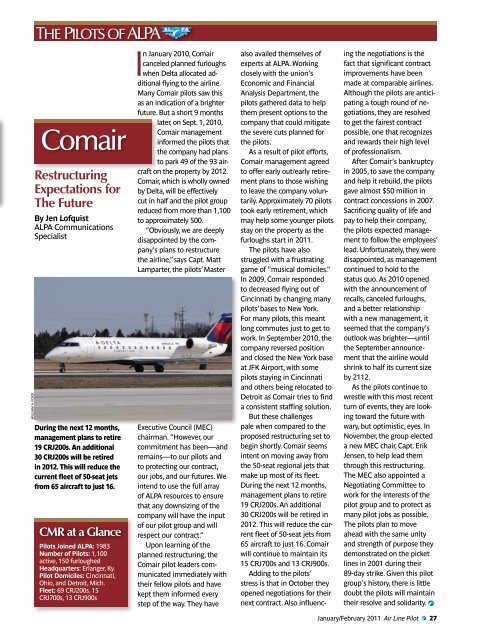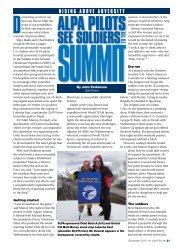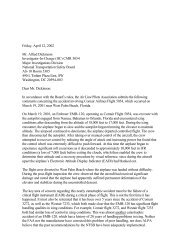The Pilots of ALPA - Air Line Pilots Association
The Pilots of ALPA - Air Line Pilots Association
The Pilots of ALPA - Air Line Pilots Association
Create successful ePaper yourself
Turn your PDF publications into a flip-book with our unique Google optimized e-Paper software.
WILLIAM A. FORD<br />
THE PILOTS OF <strong>ALPA</strong><br />
Comair<br />
Restructuring<br />
Expectations for<br />
<strong>The</strong> Future<br />
By Jen L<strong>of</strong>quist<br />
<strong>ALPA</strong> Communications<br />
Specialist<br />
During the next 12 months,<br />
management plans to retire<br />
19 CRJ200s. An additional<br />
30 CRJ200s will be retired<br />
in 2012. This will reduce the<br />
current fleet <strong>of</strong> 50-seat jets<br />
from 65 aircraft to just 16.<br />
CMR at a Glance<br />
<strong>Pilots</strong> Joined <strong>ALPA</strong>: 1983<br />
Number <strong>of</strong> <strong>Pilots</strong>: 1,100<br />
active, 150 furloughed<br />
Headquarters: Erlanger, Ky.<br />
Pilot Domiciles: Cincinnati,<br />
Ohio, and Detroit, Mich.<br />
Fleet: 69 CRJ200s, 15<br />
CRJ700s, 13 CRJ900s<br />
In January 2010, Comair<br />
canceled planned furloughs<br />
when Delta allocated additional<br />
flying to the airline.<br />
Many Comair pilots saw this<br />
as an indication <strong>of</strong> a brighter<br />
future. But a short 9 months<br />
later, on Sept. 1, 2010,<br />
Comair management<br />
informed the pilots that<br />
the company had plans<br />
to park 49 <strong>of</strong> the 93 aircraft<br />
on the property by 2012.<br />
Comair, which is wholly owned<br />
by Delta, will be effectively<br />
cut in half and the pilot group<br />
reduced from more than 1,100<br />
to approximately 500.<br />
“Obviously, we are deeply<br />
disappointed by the company’s<br />
plans to restructure<br />
the airline,” says Capt. Matt<br />
Lamparter, the pilots’ Master<br />
Executive Council (MEC)<br />
chairman. “However, our<br />
commitment has been—and<br />
remains—to our pilots and<br />
to protecting our contract,<br />
our jobs, and our futures. We<br />
intend to use the full array<br />
<strong>of</strong> <strong>ALPA</strong> resources to ensure<br />
that any downsizing <strong>of</strong> the<br />
company will have the input<br />
<strong>of</strong> our pilot group and will<br />
respect our contract.”<br />
Upon learning <strong>of</strong> the<br />
planned restructuring, the<br />
Comair pilot leaders communicated<br />
immediately with<br />
their fellow pilots and have<br />
kept them informed every<br />
step <strong>of</strong> the way. <strong>The</strong>y have<br />
also availed themselves <strong>of</strong><br />
experts at <strong>ALPA</strong>. Working<br />
closely with the union’s<br />
Economic and Financial<br />
Analysis Department, the<br />
pilots gathered data to help<br />
them present options to the<br />
company that could mitigate<br />
the severe cuts planned for<br />
the pilots.<br />
As a result <strong>of</strong> pilot efforts,<br />
Comair management agreed<br />
to <strong>of</strong>fer early out/early retirement<br />
plans to those wishing<br />
to leave the company voluntarily.<br />
Approximately 70 pilots<br />
took early retirement, which<br />
may help some younger pilots<br />
stay on the property as the<br />
furloughs start in 2011.<br />
<strong>The</strong> pilots have also<br />
struggled with a frustrating<br />
game <strong>of</strong> “musical domiciles.”<br />
In 2009, Comair responded<br />
to decreased flying out <strong>of</strong><br />
Cincinnati by changing many<br />
pilots’ bases to New York.<br />
For many pilots, this meant<br />
long commutes just to get to<br />
work. In September 2010, the<br />
company reversed position<br />
and closed the New York base<br />
at JFK <strong>Air</strong>port, with some<br />
pilots staying in Cincinnati<br />
and others being relocated to<br />
Detroit as Comair tries to find<br />
a consistent staffing solution.<br />
But these challenges<br />
pale when compared to the<br />
proposed restructuring set to<br />
begin shortly. Comair seems<br />
intent on moving away from<br />
the 50-seat regional jets that<br />
make up most <strong>of</strong> its fleet.<br />
During the next 12 months,<br />
management plans to retire<br />
19 CRJ200s. An additional<br />
30 CRJ200s will be retired in<br />
2012. This will reduce the current<br />
fleet <strong>of</strong> 50-seat jets from<br />
65 aircraft to just 16. Comair<br />
will continue to maintain its<br />
15 CRJ700s and 13 CRJ900s.<br />
Adding to the pilots’<br />
stress is that in October they<br />
opened negotiations for their<br />
next contract. Also influenc-<br />
ing the negotiations is the<br />
fact that significant contract<br />
improvements have been<br />
made at comparable airlines.<br />
Although the pilots are anticipating<br />
a tough round <strong>of</strong> negotiations,<br />
they are resolved<br />
to get the fairest contract<br />
possible, one that recognizes<br />
and rewards their high level<br />
<strong>of</strong> pr<strong>of</strong>essionalism.<br />
After Comair’s bankruptcy<br />
in 2005, to save the company<br />
and help it rebuild, the pilots<br />
gave almost $50 million in<br />
contract concessions in 2007.<br />
Sacrificing quality <strong>of</strong> life and<br />
pay to help their company,<br />
the pilots expected management<br />
to follow the employees’<br />
lead. Unfortunately, they were<br />
disappointed, as management<br />
continued to hold to the<br />
status quo. As 2010 opened<br />
with the announcement <strong>of</strong><br />
recalls, canceled furloughs,<br />
and a better relationship<br />
with a new management, it<br />
seemed that the company’s<br />
outlook was brighter—until<br />
the September announcement<br />
that the airline would<br />
shrink to half its current size<br />
by 2112.<br />
As the pilots continue to<br />
wrestle with this most recent<br />
turn <strong>of</strong> events, they are looking<br />
toward the future with<br />
wary, but optimistic, eyes. In<br />
November, the group elected<br />
a new MEC chair, Capt. Erik<br />
Jensen, to help lead them<br />
through this restructuring.<br />
<strong>The</strong> MEC also appointed a<br />
Negotiating Committee to<br />
work for the interests <strong>of</strong> the<br />
pilot group and to protect as<br />
many pilot jobs as possible.<br />
<strong>The</strong> pilots plan to move<br />
ahead with the same unity<br />
and strength <strong>of</strong> purpose they<br />
demonstrated on the picket<br />
lines in 2001 during their<br />
89-day strike. Given this pilot<br />
group’s history, there is little<br />
doubt the pilots will maintain<br />
their resolve and solidarity.<br />
January/February 2011 <strong>Air</strong> <strong>Line</strong> Pilot 27





